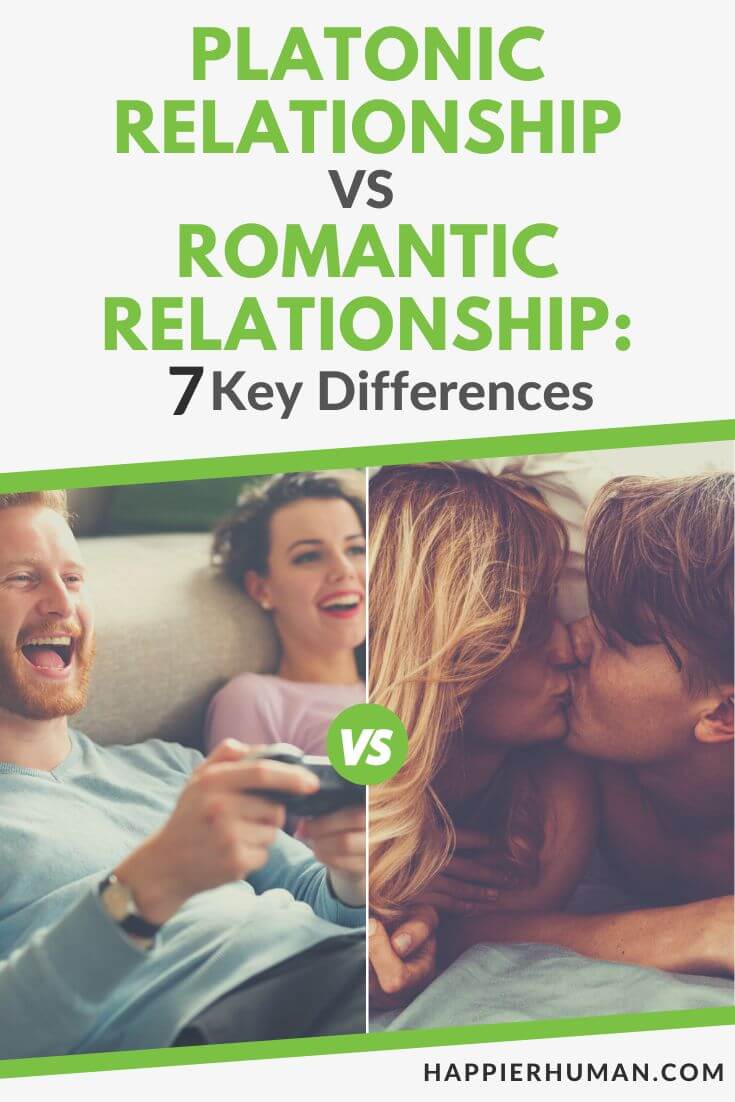A standard romantic relationship of “boy meets girl” can be uncertain, but when you feel an attraction that’s not physical, you may wonder if you’re somehow broken. Platonic relationships, where you love someone but have no physical desire for that person, are increasingly becoming an accepted norm.
My first partner and I were quite confused when we preferred to be friends instead of lovers. I decided to learn more about the platonic relationship vs romantic relationship concept. Here’s what I discovered.
What Are Platonic VS Romantic Relationships?
A platonic relationship is a relationship that is based on deep love for another person. However, your love is triggered and enriched by the person’s intellect, personality, quirks, and presence… and not purely by their physical existence or attraction.
Platonic relationships aren’t confined by the gender of the two (or more) partners involved in the relationship. It can be a same-sex couple, opposite-sex couple, or even “differently” gendered couples. The core principle is that the partners love each other deeply, without there being a need for physical intimacy.
When you have a platonic love relationship, you are more interested in spending time together, being great friends, supporting each other, and being happy together than in having children, making love, or physical touching.
In contrast to this, a romantic relationship is based on physical attraction firstly. Hot flushes when your partner looks at you, a desire to be physically closer, making love frequently, and feeling thrilled by each touch are all par for the course with romantic love.
In a platonic relationship, you may not want to engage in physical or sexual acts with your partner, which can be confusing because you’re being told by society that it’s the way of things to have sex, have children, and do it again.
You may wonder if your libido is like a bonsai or if you’re just weird. It can be very lonely when you don’t know how to explain to your partner that you don’t want intimacy.
Sometimes platonic relationships can be platonic on only one side. This leads to the “friend zone” and one-sided love, which can be very painful and traumatic.
Benefits of a Platonic Relationship
As with all things in life, there are benefits and negatives to being in a platonic relationship. In some respects, it may even be better to choose a platonic relationship over a romantic one. Here are some benefits to consider:
Less Stress and More Support
Platonic relationships aren’t driven by hormones or social pressures. You don’t have to worry about having kids by X-time or being the “man of the house.” Instead, you can simply focus on accepting your partner and know that they already accept you.

Stress is often generated when we don’t feel fully supported or respected. The real beauty of a platonic relationship is that you’re friends first, partners second. Whatever happens, you know your partner has your back, and you’ve got theirs.
In a platonic relationship, you and your partner focus on being there for each other, supporting and loving each other more than you focus on being attractive or maintaining some idealized version of yourself. With less of the urge to please, you feel less stressed and know peace each day.
Better Communication Skills
Let’s face it, not everyone can hold a great conversation. There are some people who can’t talk to save their life due to their lack of communication skills. In a platonic relationship, you can build great communication skills because your partner is more interested in what you have to say than in only physical closeness.
Sharing “this or that questions” is a great way to really get the communication ball rolling.
Because a platonic relationship allows you to show compassion and freely express how you’re feeling, you will get better at speaking and voicing your thoughts. Happiness happens when you create a safe space to share and be heard with your partner as they are firstly your friend.
Belonging and Home
When you’re with someone who values you for you, not for what you can do for them, you are in a real relationship that’s open to challenges but still welcomes you back home. That relationship is your home, no matter what. Because platonic partners are more interested in each other’s happiness, they tend to focus on belonging and building a sense of home. The result is a more peaceful relationship.
Deeper Trust
With the right communication, you and your platonic partner can build deeper trust as there is less sexual tension in the relationship. You are less inclined to fear your partner will cheat on you when your love is platonic.
Platonic relationships are the next level of friendships where you’ve put aside your ego to really invest in your partner for their own benefit.
Giving and Receiving Love
When you trust your partner so completely, talk about your feelings in an open way, and feel like you belong, you will feel like you can give more love, while also receiving more love. There really are no strings attached.
Better Health
Since you’re in a more peaceful relationship when it’s platonic, you are also boosting your overall health more. Better health is a direct result of a reduction in stress levels. When you are assured your platonic partner won’t simply walk out on you, it becomes more possible to take better care of yourself.
Self-care is important and your platonic partner is more inclined to help you experience that than your romantic partner would.
Negatives of Being in a Platonic Relationship
The main negative aspect of a platonic relationship is that you fall for it deeply. Losing that connection hurts. If you have a sexual relationship with your platonic partner, you can lose the platonic relationship and suffer the end of the original platonic relationship.

If it doesn’t work out between you and your platonic partner when you push for the relationship to become romantic, you will feel this in the same way you would if there was a break in trust or infidelity.
The best way to move to a romantic relationship in your platonic relationship is to be up front and discuss everything with your partner, making sure you both want to transition to a romantic and physical relationship. Neither party should feel pressured.
Platonic Relationship VS Romantic Relationship: 7 Key Differences
Knowing what the benefits and negatives are of a platonic relationship vs romantic relationship, it’s time to look at some differences too. The following differences help us understand the pros and cons of both of these relationships.
Difference #1. No Sex
OK, let’s get the elephant out of the room: sex. The main difference between platonic and romantic relationships is that a platonic relationship doesn’t involve any sexual intimacy. However, there may be limited physical intimacy in the form of hugs and holding hands.
When it comes to kissing and sharing physical space in a sexual way (such as hugging when naked), you move into a romantic relationship.
The moment a platonic relationship dips (pardon the pun) into sexual intimacy, it is no longer a platonic relationship, and the catch is that you can’t always or easily go back to a platonic relationship once you’ve crossed that line.
Difference #2. Absence of Passion
When you’re in a platonic relationship, you would rather use words like “caring,” “compassionate,” or “friendship” to describe your relationship. Your partner means the world to you, and you would literally walk through fire for them, but you don’t “burn” for them.
Romantic relationships are characterized by words like “passion,” “chemistry,” or “desire.” While a romantic relationship is also about partnership, it is more about a deep physical desire for the other person to be with them non-stop and not being able to “get enough of them.”
Difference #3. Less Performance Pressure
Romantic couples are always looking for the next thing to do together. They read up on new sexual positions, couples activities, and see counselors because they fear they will lose what they have—any candle will burn dimly over time. The quest to keep their relationship alive will create pressure to be more “in love” than ever.
A platonic relationship is less pressured to “be alive in your relationship.” Instead, it’s like a good and worn-out sofa on a rainy day with no pressure to be or do or go or show. Platonic partners know they love each other, and they are instinctively there for each other, even when there’s a distance between them. Their connection is deep enough and rooted in their friendship, so they don’t have to prove they love each other.
Difference #4. Relationship Equality
If you’ve ever been in a relationship where you felt like you had to do something for the other person because they did something for you, then you are in a romantic relationship. Romantic partners are constantly keeping score—even if they do it subconsciously. Where there is a burning passion, there is also envy.
In a romantic relationship, you will constantly be trying to show off to the person you love, instead of simply living that love.

Platonic partnerships are different in that they are utterly selfless. Instead of trying to impress your partner, you simply do whatever it is they need (often without thinking), and you don’t keep score of who did what or who’s due for sacrifice. In a platonic relationship, both partners simply know their motto is “Whatever you need, I am here for you.” And they mean it.
Narcissism may often present itself in romantic relationships because these relationships are fragile and open to combustible interactions, while platonic relationships are based on care, making narcissism less likely.
Difference #5. Less Complications and More Time to Grow
In a platonic relationship, both partners support each other, leaving room to grow together. There is no fear of being “dumped for a younger or sexier model,” so partners can really be open and share their needs and thoughts.
It’s liberating and way more supportive to know you have a safe space with your partner to share, that your sharing won’t be labeled as being needy or rejected for not being sexy. Real care and compassion (not stereotypical passion and desire) will carry you further than in a romantic relationship.
Romantic relationships are loaded with some type of apprehension. You fear really telling your partner what you think or feel (especially when it’s about them), causing a lingering unease.
The main silencer is that you know there are other fish in the sea, so you fear your partner will decide to throw you back and go for another catch.
Difference #6. You Can Talk About Others
It’s a rare gift that you can openly talk about others and your relationships with others with your platonic love partner.
I wouldn’t advise you to talk to your partner about other romantic partners as this would place unreasonable pressure on your platonic relationship (and yeah, you can have both relationships at the same time, but it’s hard to manage and keep both partners happy). You can discuss your friendships and other relationships with your partner when your love is platonic.
In contrast, when you’re in a romantic relationship, you may feel guarded and be unable to share your deeper thoughts with your romantic partner. There’s a fear of losing out or not being accepted by your romantic partner.
Difference #7. Conflict vs Compromise
Conflict is common in any relationship, whether platonic, romantic, or friendly. Platonic relationships embrace conflict as a way to work toward growth and development. However, romantic relationships will rather end with one partner compromising instead of the other partner working through it.
In romantic love, the partners are afraid of losing out because of conflict, so they opt for the path of least resistance, but this can breed contempt. Platonic relationships strive to work through conflict, using it as a means for learning new information about each other, with neither party held to blame.
Romantic partners may hear you, but a platonic partner will really listen to you. When you share burdens, you open communication and defang conflict, fostering a sharing mindset.
Final Thoughts on Platonic Relationship VS Romantic Relationship
Personally speaking, my platonic relationships are the best that I’ve had in my life. Despite moving on because I did want a romantic relationship too, I am still long-time friends with my platonic partners.
Sadly, I can’t say the same for past lovers, where ending the romance led to ending the relationship (often badly). You can always say “it was amicable”… but I’ve yet to find the couple that really means it. At least not, whole-heartedly.
In the end, a platonic relationship can lead to romance… in fact, it often does. Think of it as the “Holy Grail” of dating, because you start off as friends and really got to know each other before deciding if you are right for one another romantically.
Friends first will ensure you’re really there for each other in good times and bad. If you think you may have this person in your life, be sure to check out this article platonic relationships and how to make them work.


